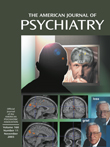Unipolar Mania Over the Course of a 20-Year Follow-Up Study
Abstract
OBJECTIVE: Using data from a longitudinal study of the mood disorders, the investigators address the phenomenon of unipolar mania. METHOD: Subjects diagnosed as having Research Diagnostic Criteria mania at intake into the study were prospectively followed for up to 20 years. RESULTS: Twenty-seven subjects had the diagnosis of unipolar mania at the time they entered the study and had no history of major depression before enrolling in the study. Seven of these subjects did not suffer any episodes of major depression during the 15- to 20-year follow-up. CONCLUSIONS: These data support the diagnostic validity of unipolar mania.



